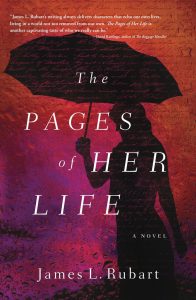by James L. Rubart, @jameslrubart

My good friend Jane asked me a question the other day and after I responded to her I realized it might be a good subject for this month’s post.
Jane asked,
“James L., a long time ago in a galaxy far away at a writers conference (2011?) you looked around the room and said something like this: ‘If an editor or agent asks you to send them your manuscript, seventy percent of you won’t follow through. You won’t send the proposal. You won’t finish your manuscript and take them up on their invite.’
Do you still think that holds true? Why do you think that is?”
Great question, yes? (Thanks, Jane!)
Here’s how I answered:
Yes, I think it’s still true. Nick Harrison is the one that told me about the lack of send back in 2006 and I heard that percentage again late last year.
Ponder that statistic for a moment.
Seven out of ten writers who are invited to send their manuscript will never take action. Whew! That doesn’t make sense!
So why don’t they?
It always (or almost always) comes down to fear.
People are scared of failure, scared of success … and more often than not they choose to embrace the fear. Or maybe better said, they embrace the way they’ve learned to live their lives.
Let me explain.

When we’re kids, we try new things all the time. We throw caution to the wind. We jump off the roof with an umbrella in hand believing we can fly. (Looking at my adventurous wife here.)
But slowly — from parents, teachers, coaches, our peers — we’re taught to be more in control of ourselves. To play it safe. To stop taking so many chances.
So when it comes to stepping outside that box and doing something risky, that might bring rejection and pain and a foray outside the norm, we take the easy way out.
“Oh, my manuscript isn’t quite ready. I’ll work on it just a bit longer.” Then two months go by and we figure it’s too late to send. (It’s not, BTW.)
Or, “My current manuscript is waaaaay stronger. I’ll get that one done and send it in instead.”
Or maybe the problem is we’re hanging too tightly onto our life.
We often interpret “we must die to ourselves” as “we must give up our dreams” but what if “die to ourselves” means to die to our ego or insecurities or what people will think of us?
What if it means to die to having to have things turn out the way we want them to? Die to our expectations shaping our lives instead of letting wild abandon and the unexpected shape our lives?
And of course this applies not just to sending in manuscripts but every area of our lives.
So let us die today, so we can truly live.

How Do You Stand Up for Yourself When It Means Losing Everything? Allison Moore is making it. Barely. The Seattle architecture firm she started with her best friend is struggling, but at least they’re free from the games played by the corporate world. She’s gotten over her divorce. And while her dad’s recent passing is tough, their relationship had never been easy. Then the bomb drops. Her dad was living a secret life and left her mom in massive debt. As Allison scrambles to help her mom find a way out, she’s given a journal, anonymously, during a visit to her favorite coffee shop. The pressure to rescue her mom mounts, and Allison pours her fears and heartache into the journal. But then the unexplainable happens. The words in the journal, her words, begin to disappear. And new ones fill the empty spaces—words that force her to look at everything she knows about herself in a new light. Ignoring those words could cost her everything . . . but so could embracing them.

James L. Rubart is 28 years old, but lives trapped inside an older man’s body. He thinks he’s still young enough to water ski like a madman and dirt bike with his two grown sons. He’s the best-selling, Christy BOOK of the YEAR, CAROL, INSPY, and RT Book Reviews award winning author of ten novels and loves to send readers on journeys they’ll remember months after they finish one of his stories. He’s also a branding expert, audiobook narrator, co-host of the Novel Marketing podcast, and co-founder with his son, Taylor, of the Rubart Writing Academy. He lives with his amazing wife on a small lake in Washington state.